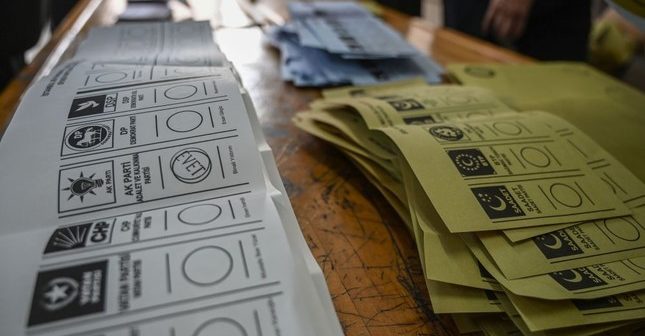
The significance of an election in a democratically governed country is determined by the context and the framework in which it is held, as well the political backdrop. If these parameters were to be applied to the municipal elections held yesterday in Turkey, in effect to determine choices for local administrations, the exercise takes on deeper and critical political character. Given where we are in our journey of modern and republican statehood close to a century, this election, as confirmed by the intensity with which the political parties have conducted their respective campaigns, brought us to a juncture with a sign boldly printed as “last exit for democracy”.
The Turkish electorate has heard this slogan before not just once but a good number of times on the eve of earlier elections. However, the fact that we are seemingly still on a democratic course should not make anyone overconfident that we shall remain on that path. The political compass that is supposed to guide us on this journey is constantly, but hopefully not irreversibly, displaying a course towards authoritarianism and an accelerated departure from secularism as well as wholesale damage inflicted upon the founding principles of the Republic not yet eliminated from our constitution.
Although this was a municipal election the campaign was about everything but local politics and municipal services. The country had never witnessed a campaign with such polarizing and threatening language on the part of the government which used every means at the disposal of the state to advance its cause. The media, largely under the patronage of the ruling JDP (Justice and Development Part), mostly reflected what the JDP leadership said. For them, the opposition didn’t exist. Thus, when measured against the internationally recognized standards of fair and free democratic elections, this election didn’t offer the contestants equal opportunity.
For the JDP the election was just another episode in its relentless quest to singularly command all state institutions at the expense of fast disappearing separation of powers and rule of law.
Their central theme was Turkey’s survival in the face of existential threats. This was no surprise since all our failures are attributed to abstract dark schemes, conspiracies by external powers determined to stop Turkey’s rise as a global power. The nature of these threats, their sources and perpetrators remain anonymous and enigmatic. But, from a cursory reading of government’s rhetoric, one cannot but conclude that our principal adversary is the West. How then does the government explain the period from 2002 to 2009, its years of ascendance and praise by its partners when relations with the West were on a totally different track? Is it the West that has changed or do we have a different Turkey?
The fundamental principles of diplomacy and statecraft are that if you create opportunities for others to meddle, they would oblige. What’s important is to keep the country on track and deny others the chance. It would be unrealistic to suggest that the JDP, after seventeen years in power, still hasn’t learned this. It must be that it chooses to disregard them deliberately on account of its political calculus to consolidate its electoral base. However, this creates opportunities for others to meddle, exploiting our vulnerabilities. Our disastrous Syria policy, not to mention the critical state of our economy, is a glaring example.
In its campaign the opposition focused on our economic decline. They addressed unemployment, inflation and foreign debt. They were after, above all, putting an end to JDP’s string of election victories, proving that this was doable.
According to unofficial results, the JDP lost mayorships in major cities such Ankara, İzmir and probably İstanbul. Ankara and İstanbul have been governed by JDP mayors for more than two decades. This is not to say that the main opposition RPP (Republican People’s Party) or the block of its partners have won. It’s just that the JDP has lost. So, to make the most of the election result, the RPP should now launch a process to overhaul the party, foremost its leadership.
In the final analysis, this was a municipal election and the JDP remains firmly in power under Turkey’s new presidential system. The result, nonetheless, reflects undeniable dissatisfaction for the current state of affairs and a desire for change.
The fundamental question now is whether the JDP leadership would read this as the yellow card, draw the necessary conclusions and change course or remain on the current path. Sadly, its record doesn’t inspire any optimism and the state of the Turkish economy remains a huge challenge. The government now has to administer the bitter pill to restore the economy and fend against the pressures of continued populism lest creating fissures in its electoral base.
This is a critical moment for the future of Turkey’s relations with the West.
There is no denying that the obituary for Turkey’s EU accession process has been written and announced by the European Parliament. Nonetheless, despite Turkish government’s continuing anti-Western rhetoric, the EU should keep engaging Turkey. They have done this even after military interventions and now is the moment to make a new effort. No matter how the Government may react to the election results, Turkey remains at the crossroads of continents and cultures rendering its geo-political location a most valuable piece of real estate, increasingly indispensable under the current state of play in the region as well as the future.
As for Turkish-American relations, President Trump seems to care little for democratic values and their projection. Thus, Ankara and Washington may find it easier to go for transactional cooperation, striking “deals” where possible. However, both capitals need to bear in mind that strong and lasting relationship between allies requires more than that.
………………………………………………………………………………….
(*) Yusuf Buluc is a retired Turkish Ambassador and a former Head of NATO’s Department of Defense Plans and Policy.
(**) Ali Tuygan, Ambassador (Ret’d) and former Undersecretary of the Turkish Foreign Ministry. The article is also published on his blog.









